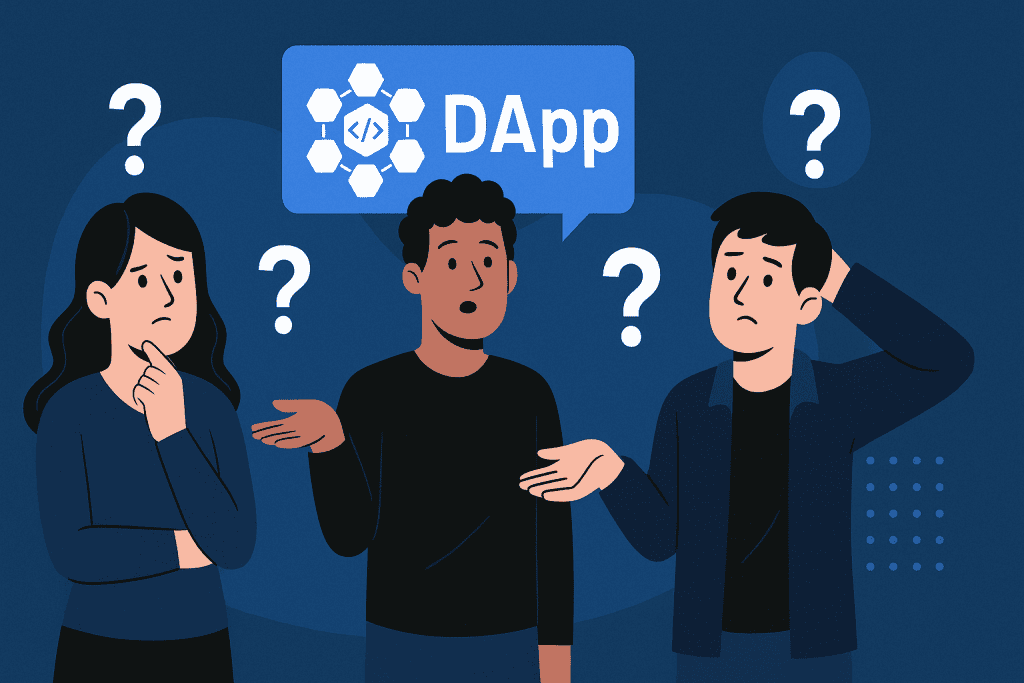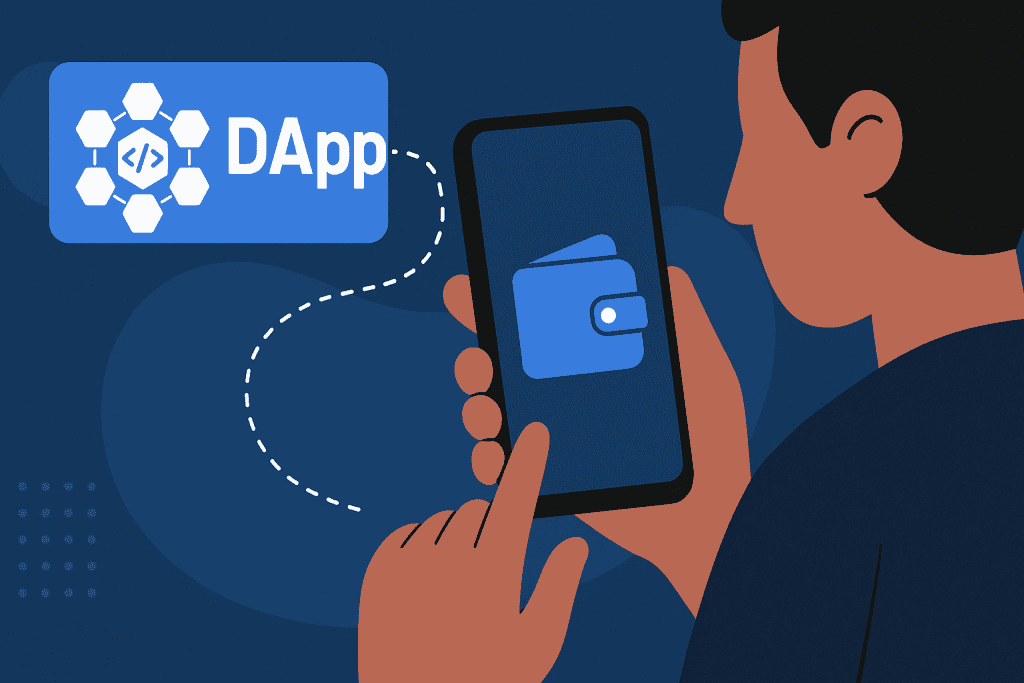If you’ve spent any time in the crypto market, you’ve probably seen the term Dapps pop up. Maybe in a tweet. Maybe on a crypto forum. Or maybe during a conversation where everyone else nodded, and you just smiled, pretending to know what it meant. But don’t worry—you’re not alone.
It might sound like just another tech buzzword, but they’re a massive shift in how we build and use apps. They run on blockchain networks and remove the middlemen from the picture. No gatekeepers. No central control.
Whether you’re eyeing your next investment, exploring the world of Bitcoin, or just curious about the evolution of digital tools, understanding Dapps puts you ahead of the curve. Let’s break it down in simple, human language.
What is Dapps?

Dapps stands for Decentralized Applications.
They’re like regular apps—think banking, messaging, or gaming—but instead of running on servers owned by one company, they run on a network of computers around the world. That network is a blockchain.
There’s no single point of failure. No one to shut it down. No hidden edits behind the curtain.
These apps are designed to be open, trustless, and transparent. Once they’re deployed, the code can’t be changed easily. They’re also often open-source, meaning anyone can inspect or improve the code.
Some people call them “smart apps” or “blockchain apps.” But whatever the nickname, the core idea stays the same: the power is decentralized.
Breaking Down Dapps
Let’s imagine you’re using a traditional app, like PayPal. When you send money, PayPal processes the request. They verify it. They control it.
Now, picture that same function—sending money—but without PayPal.
That’s where a Dapp steps in. Dapps are powered by smart contracts—self-executing lines of code on the blockchain that perform actions when certain conditions are met. No humans required.
Take Uniswap, for example. It’s a decentralized exchange (DEX). You want to swap Ethereum for another token? Just connect your wallet, choose the trade, and click go. A smart contract handles everything behind the scenes.
There’s no customer service. No approval process. Just code doing its job.
And it’s not just finance. Decentralized Applications. are booming in areas like gaming, data storage, identity, and more. Want to play a game where you actually own your items and can sell them for real value? Dapps can do that.
They offer full ownership, reduced censorship, and fewer fees. But they also require users to understand wallets, gas fees, and private keys. It’s a different mindset. A different internet. But once you’re in, it’s hard to go back.
History
Decentralized Applications. didn’t just appear overnight.
Their story begins with the launch of Bitcoin in 2009. While Bitcoin itself isn’t a Dapp, it introduced the idea of decentralized systems.
The next big leap came with Ethereum in 2015. Ethereum added smart contract functionality, allowing developers to build Dapps directly on its network. Since then, it’s been a whirlwind.
From simple games like CryptoKitties to complex DeFi protocols, Dapps have exploded. New blockchains like Solana, Avalanche, and Binance Smart Chain have joined the race, offering faster and cheaper alternatives to Ethereum.
| Year | Milestone |
|---|---|
| 2009 | Bitcoin launches, introducing decentralized systems |
| 2013 | Ethereum is proposed by Vitalik Buterin |
| 2015 | Ethereum launches, enabling smart contracts |
| 2017 | CryptoKitties causes Ethereum network congestion |
| 2020 | DeFi boom sparks massive growth in Dapps |
Types
Dapps aren’t one-size-fits-all. They come in many flavors, each with its own purpose.
Financial Dapps (DeFi)
These Dapps are shaking up traditional banking. Users can lend, borrow, earn interest, or trade—without banks.
Gaming Dapps
Think play-to-earn. Users collect assets like characters or gear and trade them in real life.
Social Dapps
Platforms like Lens Protocol are giving users control over their data and content. No ads, no algorithms.
NFT Marketplaces
Apps like OpenSea let users buy and sell digital collectibles. Everything from art to virtual land.
Utility Dapps
These offer real-world tools—like decentralized cloud storage, voting platforms, and identity verification.
| Type | Example | What It Does |
|---|---|---|
| Financial | Aave, Uniswap | Trading, lending, saving |
| Gaming | Axie Infinity | Play-to-earn gaming |
| Social | Lens Protocol | Decentralized social media |
| NFT Marketplace | OpenSea | Trading digital collectibles |
| Utility | Filecoin, Civic | Storage, identity, tools |
How Does it Work?
Here’s how it works behind the scenes.
You connect your wallet to a Dapp. That wallet acts as your ID. Then, you interact with a smart contract. Want to send funds? Place a trade? Cast a vote? The contract executes based on your input.
The blockchain records every step. No one can alter it. This system is borderless. You don’t need an account. You don’t even need to trust the developers. The code is the law.
It’s automation, decentralization, and transparency—all rolled into one.
Pros & Cons
Decentralized Applications. aren’t perfect. Like everything, they come with trade-offs.
| Pros | Cons |
|---|---|
| Transparent | Can be complex for beginners |
| No middlemen | High gas fees on some blockchains |
| Censorship-resistant | Not as fast as centralized apps |
| User-owned | Bugs in smart contracts can be risky |
| Open-source and flexible | Regulation is still catching up |
Still, for many users, the benefits outweigh the risks—especially in volatile spaces like the coin market.
Uses

Let’s get practical. How are Dapps used in real life?
Finance
DeFi Dapps like Compound or Curve let you earn interest, take out loans, and swap tokens—without banks or paperwork.
It’s a faster, more global financial system. No credit checks. No waiting.
Gaming
Games like Axie Infinity reward players with crypto. You can battle, breed, and trade creatures—and cash out real profits. It turns gaming into an economy.
Identity & Privacy
Dapps like Civic let you control your digital identity. Instead of giving your data to every app, you use one secure, private key.
You decide who sees what.
Content Creation
Artists, writers, and musicians are using Dapps to publish and monetize their work directly. No need for platforms that take huge cuts.
It’s a new form of ownership and revenue.
Governance
With tools like DAOs, users can vote on key decisions. Want to change how a platform operates? You hold a token. You get a say. It’s a digital democracy.
Resources
- Investopedia. Decentralized Applications (DApps)
- How-To Geek. What Are Decentralized Apps (DApps), and How Do They Work?
- CoinTelegraph. What Are DApps? Everything There Is to Know About Decentralized Applications
- Ethereum. Dapps Documentation
- Crypto.News. What Are Dapps?
